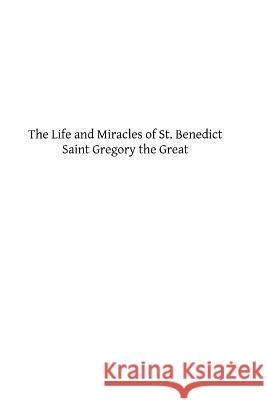The Life and Miracles of St. Benedict » książka
The Life and Miracles of St. Benedict
ISBN-13: 9781484084304 / Angielski / Miękka / 2013 / 162 str.
The present volume reproduces a work of antiquity, which describes the Life and Miracles of St. Benedict in a narrative full of beautiful simplicity and filial love-a narrative whose every page bears the impress of patristic authority and monastic devotedness. This narrative flows from no less distinguished a pen than that of the Monk-Pope St. Gregory the Great. He writes with the credentials of the Vicar of Jesus Christ upon earth, and is supported by the testimony of those who were at the same time eye-witnesses of the facts he describes, and his own intimate and cherished brethren in religion. Hence the filial admiration which he displays of the' Venerable Father' who, as he says, ' wrote a rule for his monks, both excellent for discretion and also eloquent for the style.' J'he translation which is here presented to the reader is also itself a relic of antiquity, having been first published in Paris in 1608. However, before speaking of the old English version, it will be well to premise a few remarks on St. Gregory's Book of 'Dialogues, ' from which the Life of St. Benedict is taken, and which constitutes the matter presented under this particular form. The second book of the 'Dialoguecs' of St. Gregory is given in its entirety to the narration of the Life and Miracles of St. Benedict. We must not, however, expect to find a finished biography of the Saint. According to the generally accepted signification of the word, we expect to find in a biography a chronological and consecutive account of the actions of the person who forms the subject of the narrative, with a more or less complete recital of the undertakings in which he was engaged and which have rendered his name celebrated; besides this-if the subject of the biography' comes within the range of hagiology-we look, moreover, for a detailed and classified rehearsal of his heroic virtues, confirmed and illustrated by a variety of miraculous manifestations of his sanctity. Now this is not precisely what St. Gregory proposed to lfimself to accomplish, and we must not therefore expect in the following pages a finished and complete biography of St. Benedict. What was the precise object St. Gregory had in view in writing the four books of his t Dialogues' we are told in the touching introduction with which the holy Monk Pope himself prefaces his work, and which I here transcribe from the same old English version already mentioned: 'Being upon a certain day too much overcharged with the troubles of worldly business, in which oftentimes men are enforced to do more than of duty they are bound, I retired myself into a solitary place, very fit for a sad and melancholy disposition, where each discontentment and dislike concerning such secular affairs might plainly show themselves, and all things that usually bring grief, mustered together, might freely be presented before mine eyes. In' which place, after that I had sat a long while in much silence and great sorrow of soul, at length Peter, my dear son and deacon, came unto me-a man whom, from his younger years, I had always loved most entirely, and used him for my companion in the study of Sacred Scripture: who, seeing me drowned in such a depth of sorrow, spake unto me in this manner: "What is the matter? or what bad news have you heard? for, certain I am, that some extraordinary sadness doth now afflict your mind." ..
Zawartość książki może nie spełniać oczekiwań – reklamacje nie obejmują treści, która mogła nie być redakcyjnie ani merytorycznie opracowana.











